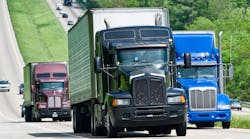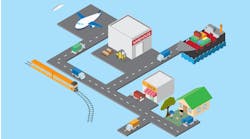Yet again, the Federal Motor Carrier Safety Administration (FMCSA) has chosen to extend its exemption from certain regulations for interstate truckers who are involved in the transportation of COVID-19 emergency relief supplies, this time to May 31. The previous exemption order had been due to expire on Feb. 28.
The exemption applies to Parts 390 through 399 of the Federal Motor Carrier Safety Regulations (FMCSRs), which include regulations applying to drivers’ hours of service (HOS) rules; federal inspection, repair and maintenance requirements; driving and parking rules; and certain commercial driver qualifications.
The HOS exemption applies until after a driver returns to the terminal or at some point informs fleet management that they need immediate rest. At that point, the driver must be allowed to take at least 10 consecutive hours of off-duty time before the driver is required to return to service. When a driver is moving from emergency relief efforts to normal operations, the 10-hour break also is required when the total time a driver operates conducting emergency relief efforts, or a combination of emergency relief and normal operations, equals 14 hours.
Also, under the exemption, FMCSA said it would not take enforcement action for certain expired commercial driver licenses (CDLs), commercial learner permits (CLPs) and medical certifications. The agency said it took this step because many of the state Department of Motor Vehicle offices have been closed and their employees have been ordered to stay home under measures taken to limit the spread of the disease.
“Many CDL and CLP holders may be unable to renew their CDLs and CLPs or provide medical certificates to their State Driver Licensing Agencies,” the exemption points out. “In addition, due to limited operations or backlogs, drivers may be unable to obtain appointments for physical examinations with medical examiners to comply with the FMCSRs.”
Because the current exemption is scheduled to expire at the end of May, the agency recommended that truck drivers take every opportunity to renew their licenses and certifications as soon as is “practicable.”
Truckers need to keep in mind that the FMCSA exemption does not apply to state laws and regulations, including compliance with applicable speed limits and other traffic restrictions; and prohibitions against texting while driving and using a handheld mobile phone while driving. Also continuing to apply are the requirements that the vehicle be properly maintained and in good operating condition, as well as laws prohibiting driving under the influence of drugs and alcohol.
It is not clear at this point when the agency ultimately will choose to end the trucker’s safety rules exemption, which was first issued in March 2020, not long after the government’s response to the pandemic first got underway.
“In the interest of ensuring continued commercial motor vehicle safety, it is FMCSA’s intention to wind down the exemptions granted under this Emergency Declaration and related COVID-19 regulatory relief measures to the extent possible,” said FMCSA Acting Administrator Meera Joshi.
The exemption applies to truckers who are hauling:
• Livestock and livestock feed.
• Medical supplies and equipment related to testing, diagnosis and treatment of COVID-19.
• Vaccines, constituent products, and medical supplies and equipment including ancillary supplies/kits for the administration of vaccines, related to the prevention of COVID-19.
• Supplies and equipment necessary for community safety, sanitation and prevention of community transmission of COVID-19, such as masks, gloves, hand sanitizer, soap and disinfectants.
• Food, paper products and other groceries for emergency restocking of distribution centers or stores.
Carriers should take note that FMCSA stresses that the exemption does not cover routine commercial deliveries, “including mixed loads with a nominal quantity of qualifying emergency relief added to obtain the benefits of this emergency declaration.”



